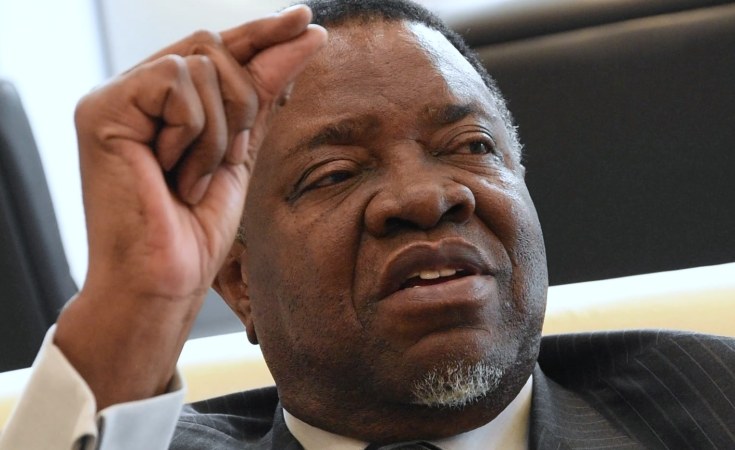President Hage Geingob says the anti-same-sex marriage bills put forward by Swapo parliamentarian Jerry Ekandjo lacked proper consultation with the party.
Geingob says the two bills were presented and passed in both the National Assembly and National Council, while minister of home affairs, immigration, safety and security Albert Kawana was at the same time working on a separate law to clarify marriage in Namibia as involving a union between a man and a woman.
"We have assigned comrade Kawana to prepare the law to make the amendments. While we are on that, so-and-so bills come in," Geingob says.
During yesterday's courtesy visit by Swapo members in the National Council, the president questioned why Ekandjo, as a Swapo member, proceeded with these bills without adequately consulting within the party beforehand.
"He is a member of Swapo, someone who is on my list, bringing that bill without consultation," Geingob said.
When contacted for comment, Ekandjo yesterday asked for questions to be sent to him via text message, which was done. He was called later and said he had no comment.
Swapo's central committee last month instructed Kawana to modify the definition of the term 'spouse' in the Immigration Control Act, which would result in same-sex marriage partners not being recognised as each other's spouses.
Ekandjo has presented two bills in response to the Supreme Court's directive to recognise same-sex marriages legally concluded outside Namibia.
The first bill aimed to redefine the term 'spouse' explicitly, referring to articles 81 and 4 of the Namibian Constitution to challenge the court's decision.
The second bill focused on amending sections of the Marriage Act, including the definition of 'marriage', 'same-sex marriage', and 'spouse'.
The bills seek to prohibit same-sex marriage, the solemnisation and recognition of such marriages.
Geingob reaffirmed Swapo's stance that marriage involves individuals of the opposite sex.
"The (Swapo) constitution has made it clear that marriage is between a man and a woman," Geingob said.
'UNCONSTITUTIONAL BILLS'
Meanwhile, Omar van Reenen, a civil rights activist, has expressed deep concern over the current state of Namibia's constitutional democracy.
He denounces the proposed bills as unconstitutional, asserting that the supreme authority of the Constitution should prevail.
He says no bill passed by the parliament or signed into law by the president should infringe upon or strip away citizens' rights, as these bills do.
"By passing these bills, a party that claims to be the steward of liberation, has shown the Namibian people they have nothing left to offer Namibian voters, besides oppression and indignity," Van Reenen says.
He points out the alarming possibility that those in power might exploit democracy, a precious achievement for which their liberators sacrificed their lives, to perpetuate the oppression of a minority group solely for the sake of power and financial gain.
"They're scapegoating the queer community for cheap campaign points because they failed to fulfil every single manifesto item since 1990.
"We will see them in court, and it's time for the Namibian people to vote out those who abuse their oath of office, or we will have nothing left to save our republic," Van Reenen says.
Van Reenen is part of a delegation of diverse queer youth activists currently in Berlin, Germany.
Agriculture minister Calle Schlettwein recently challenged Ekandjo's views, saying the bills go against human rights as enshrined in the Constitution.
The Southern Africa Litigation Centre (Salc) has called on Namibian lawmakers and Geingob not to pass Ekandjo's bills.
The organisation says introducing laws that contradict a constitutional interpretation of fundamental human rights and freedoms under the Namibian Constitution constitutes a step backwards and paves the way for instability by undermining the supremacy of the Constitution.
"Passing the amendment into law established a dangerous precedent that constitutes a threat to all fundamental freedoms and rights protected under the Constitution," the statement reads.


